The Last Six Verses of Revelation
From Textus Receptus
Erasmus’ first edition of the printed Greek and Latin New Testament dig-lot called the Novum Instrumentum (New Instrument) has been the subject of a vicious and unwarranted attack by textual critics. One of the accusations against Erasmus is that he possessed only one Greek manuscript of Revelation when he compiled the text of Revelation which had the final six verses missing, and so he back-translated the Latin into Greek for the 1516 edition.
Timeline
(work in progress)
- Pre 1516 Erasmus borrows the a manuscript of (Ἐρμηνεία εἰς τὴν Ἀποκάλυψιν) from Johann Reuchlin (after 1861 this was claimed to be Minuscule 2814 but this is uncertain).
- Pre 1516 Erasmus extracts the Greek Scriptures from that manuscript formulating the text of Revelation (some claim he only used an assistant for this task and didn't actually see the text, but only corrected it)
- Apparently Erasmus retranslated the last six verses of Revelation from Latin, a story that began with Johann Albrecht Bengel and was apparently confirmed with Franz Delitzsch in 1861.
- In the 1516 Annotationes of Erasmus he claims to have amended a few words from the Latin and that this can be fixed by the Aldine.
- Erasmus corresponds with Lee
- Erasmus corresponds with Stunica
- In 1861, Franz Delitzsch claims in a book to have found the manuscript Erasmus used.
- Evangelical Tregelles "confirms" the anecdotes of Erasmus placing doubt upon him and the Textus Receptus in Revelation.
Anecdotes
Those who study Erasmus will be aware of the plethora of anecdotal stories that surround him. Some of these include:
- Erasmus was pressed for time and so rushed through the text of Revelation
- Erasmus did not have a single manuscript with the complete book of Revelation
- Erasmus produced a Greek text of the last six verses based on the Latin Vulgate
- The Latin was more important to Erasmus than the Greek
- Erasmus lost a bet and had to include the Johannine Comma into his text
- Erasmus had a low view of the book of Revelation
Erasmus' Sources
Minuscule 2814
Reuchlin's Codex, Minuscule 2814 (in the Gregory-Aland numbering), Aν20 (Soden), formerly it was labelled as 1rK in all catalogs, but it was renumbered as a 2814 by Aland, is a Greek minuscule manuscript of the New Testament, dated palaeographically to the 12th century. The codex contains the Book of Revelation with a commentary of Andreas from Caesarea. The last six verses are lost (22:16-21). The text is written on a parchment in minuscule, in 1 column per page, 20 lines per page.
The commentary was of importance to Erasmus because it was ascribed to Hippolytus c. 200 A. D.. This would reflect the pre-Nicene era and link back to the early church writers, with Hippolytus being the disciple of Irenaeus, Irenaeus of Polycarp and Polycarp of John, although it had been amended by Andreas and Arethas in much later times.
The Extraction of the Biblical Text
Erasmus extracted the Greek biblical text of Revelation out of the Greek commentary:
- Ex eo contextus verba describenda curauimus (ASD IX-4)
Translated by Erika Rummel as:
- “From it I had the words of the text copied out” (CWE 72)
Most scholars say he used another scholar to do this work. Erika Rummel for example stated that: “Since the text was imbedded in the commentary and difficult to read, Erasmus had a clean copy made, returning the original to its owner. The unknown copyist introduced a number of mistakes that made their way also into the printed text.” In a footnote she said that: “Bludau16 suggests that it was the poet laureate Henricus Glareanus, who was in Basel at that time and whose scholarly abilities Erasmus appreciated.”
Andrew Brown says in his ASD IX-4;
- “Because of the promise that the manuscript would be returned to Reuchlin unharmed (incontaminatus), Erasmus instructed an assistant to copy the scripture citations by hand, so as to form a separate continuous text, which the type setters would be able to follow more easily: “ex eo contextus verba describenda curauimus” (“from that [manuscript], we arranged for the words of the [scripture] text to be copied out”).” - ASD VI-4
Jan Krans says
Minuscule 2049 (Hoskiers’ 141)
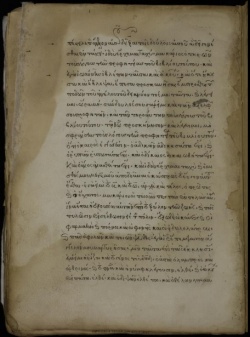
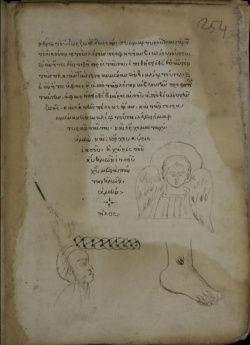
Minuscule 2049, numbered by Hoskier as 141, is from the sixteenth century, and regarded as a copy (Abschrift) of a printed edition, probably Erasmus’ fourth (1527). Erasmus and the Text of Revelation 22:19, p. 10 Jan Krans.
Valla
Erasmus consulted notes such as the annotations of Laurentius Valla.
Erasmus also examined the Lauretianus Codex in Revelation 8:13 which was Laurentius Vallas manuscript with annotations.
Erasmus Annotations
James White claims: “Erasmus used only one manuscript for Revelation”, but Erasmus said in Revelation 1:6
- “sic enim est in graecis exemplaribus...”
Translated as
- “It is in the Greek copies (plural)...”
Here are Erasmus's own words, from his Annotationes, page 675 (625) (Full title: In Novum Testamentum annotationes, ab ipso autore iam quartum recognitae, & ex Graecis codicibus quos postea nactus est auctario neutiquam poenitendo locupletatae):
- Quamquam in calce huius libri nonnulla verba reperi apud nostros quae aberant in Graecis exemplaribus; [B]ea tamen ex latinis adiecimus.
In English:
- However, at the end of this book, I found some words in our versions which were lacking in the Greek copies, but we added them from the Latin.
Aldine
Most scholars conclude that Erasmus didn’t know the Aldine edition followed his own and thus he simply copied in what he had back translated from the Latin in his 1516. It is a strange and bizarre concept but it is almost unquestioned in many circles:
- "Erasmus' misunderstanding of the nature of the Aldine text could also have led him to imagine that the Aldine provided independent verification of the correctness of his retranslations from the Latin Vulgate into Greek, at passages where the Aldine simply copied Erasmus' text. This may help to explain why his retranslation of several verses at the end of the Apocalypse was only partly revised in later editions, as the Aldine Bible gave the appearance of supporting his printed text. The same conclusions may also explain why the other retranslated passages in the Apocalypse were left almost unchanged." (Andrew Brown, ASD VI-4, pg. 12).
Timelines
The first quotation by Erasmus
1516
- Quamquam in calce huius libri nonnulla ver ba reperi apud nostros quae aberant in Graecis exemplaribus; ea tamen ex latinis adiecimus.
Translated as:
- However, at the end of this book, I found some words in our versions which were lacking in the Greek copies, but we added them from the Latin.
Annotationes 1516, p. 625 (Mistakenly printed in most copies as 675)
1519
- (Omit)
1522
- (Omit)
1527
- (Omit)
1535
- (Omit)
So as we can see, Erasmus only quoted the words in the 1516 edition and no other. It seems clear that when Erasmus says: "However, at the end of this book, I found some words in our versions which were lacking in the Greek copies, but we added them from the Latin," that he is speaking about how the Greek was lacking in the Reuchlin Codex, and he filled it in from the Latin in his copy of that codex.
Answer to Edward Lee’s Annotations
- non his contentus, impingit mihi flagitium impium, idque ante tempus, videlicet frequenter infulciens, si quid habet odiosius, quod in fine Apocalypsis, paucula verba adiecerim Graeco codici ex nostris Latinis.
Translated as:
- “Not content with that, he [Lee] accused me of an impious crime.... that in the end of the Book of Revelation I added a small number of words in a Greek codex from our Latin copies”
Historically, Erasmus had stood against back translating and was disgusted to have been accused of it in his text.
Source: Opera, ix, 1706, col. 150
Erasmus replied to Lee in 1520, Responsio ad annotationes Eduardi Lei (“Answer to Edward Lee’s Annotations”), page 278:
- Dubium non erat quin essent omissa, et er – ant perpauca. Proinde nos, ne hiaret lacuna, ex nostris Latinis supplevimus Graeca. Quod ipsum tamen noluimus latere lectorem, fassi in annotationibus quid a nobis esset factum ut, si quid dissiderent verba nostra ab his quae posuisset autor huius operis, lector nactus exemplar restitueret. … Et tamen hoc ipsum non eramus ausuri in Euangeliis, quod hic fecimus, ac ne in epistolis quidem apostolicis. Huius libri sermo simplicissimus est, et argumentum fere historicum, ne quid dicam, de autore olim incerto. Postremo locus hic coronis tantum est operis.
- There was no doubt that the words had been omitted, and they were only a few. To avoid leaving a lacuna in my text, I supplied the Greek out of our Latin version. I did not want to conceal this from the reader, however, and admitted in the annotations what I had done. My thought was that the reader, if he had access to a manuscript, could correct anything in our words that differed from those put by the author of this work. … And yet I would not have dared to do in the Gospels or even in the apostolic Epistles what I have done here. The language of this book is very simple, and the content has mostly a historical sense, not to mention that the authorship was once uncertain. Finally, this passage is merely the conclusion of the work.
Source: Resp. ad annot. Ed. Lei, ASD IX-4, p. 278 ll. 35-39 and 39-43; cf. p. 120 ll. 303-304. (1520) Translated by Erika Rummel
This section is actually dealing with one verse. Note: "There was no doubt that the words had been omitted, and they were only a few." 135 words of the last six verses are not "only a few".
- But I have a very good justification. I did not have the manuscript in the first edition; in the second edition I had the help of the Aldine edition. Therefore I fulfilled the promise I had made in the first edition. (CWE 72, pg. 45) - Note: The Latin of this has yet to be examined by me.
Erasmus's own words, from his Apologia qua respondet duabis inuectiuis Eduardi Lei (“Defense which responds to Edward Lee’s two invectives”), pages 54-55:
- In calce Apocalypsis in exemplari quod tum nobis (erat unicum, nam is liber apud Graecos rarus est inventu), deerat unus atque alter versus. Eos nos addidimus, secuti Latinos codices. Et erant eiusmodi ut ex his quae praecesserant possent reponi. Cυm igitur Basileam mitterem recognitum exemplar, scripsi amicis ut ex aeditione Aldina restituerunt eum locum. Nam mihi nondum emptum erat hoc opus. Id ita, ut iussi, factum est. Queso, quid hic debetur Leo? An ipse quod deerat restituit? Atqui nullum habebat exemplar nisi meum. Sed admonuit. Quasi vero non hoc testatus sim in prioribus annotationibus, quid illic egissem et quid desyderarem.
In English:
- At the end of the Apocalypse, the manuscript I used (I had only one, for the book is rarely found in Greek) was lacking one or two lines. I added them, following the Latin codices. They were of the kind that could be restored out of the preceding text. Thus, when I sent the revised copy to Basel, I wrote to my friends to restore the place out of the Aldine edition; for I had not yet bought that work. They did as I instructed them. What, I ask you, do I owe to Lee in this case? Did he himself restore what was missing? But he had no text except mine. Ah, but he warned me! As if I had not stated in the annotations of the first edition what I had done and what was missing.
Erasmus’ words are as follows, first in Latin, then in translation (Wetstein, Prolegomena in Novum Testamentum, 1764, p. 331f., citing Erasmus “contra Leum §. 243” = Opera, ix, 1706, AD CCXLIII, col. 246):
- “Quoniam Graecis nunquam magnopere placuit liber Apocalypseos, rarus habetur apud illos. Itaque quum cuperemus nihil abesse nostrae Editione, aegre extorsimus ab Inclyto viro Ioanne Capnione vestustissimum Codicem, Commentarium habentem in hoc opus. Ex eo contextus verba describenda curavimus. In calce vero scribarum incuria deerant haec: Et si quis diminuerit de verbis libri Prophetiae huius, auferet Deus partem eius de libro Vitae et de Civitate sancta, et de his, quae scripta sunt in isto libro. Sensimus autem scribam per eam occasionem errasse, quod quum bis ponatur in isto libro, ille ad posterius oculos deflexerit, relictis quae sunt in medio. Siquidem ad nullum lapidem frequentius impingunt librarii. Dubium non erat, quin essent omissa, et erant perpauca. Proinde nos, ne hiaret lacuna, ex nostris Latinis supplevimus Graeca, Quod ipsum tamen non noluimus latere lectorem, fassi in Annotationibus, quid a nobis esset factum, vt si quid dissiderent verba nostra ab his, quae posuisset autor huius operis, lector nactus exemplar restituerit.”
- “Because the Book of Revelation never particularly suited the Greeks, it is rarely found among them. And so, since we were desirous that our Edition should be remiss in no respect, with considerable effort we extorted out of that Illustrious man John Capnio a very ancient codex, which contained a Commentary to this work. From that we could ensure the words that belong together were correctly transcribed. But at the end the following words were missing by a scribal error: ‘And if anyone shall take away from the words of the prophecy of this book, God shall take his part out of the book of Life and from the Holy City, and from those things which are written in this book.’ But our impression was that a scribe had made a mistake in that instance, since, as the words ‘in this book’ occur twice, his eyes passed involuntarily over to the latter occurrence, thus omitting the phrases in between. And indeed, book-writers make no mistake more frequently than this. There was no doubt these words had been omitted by error, and that their number was small. Therefore, to avoid a gap in the text, we made good the Greek from our Latin copies. But since we did not want this to escape the notice of the reader, we made mention of what we had done in the annotations, so that if our words differed in any way from those which the author of this work originally set down here, the reader once having procured a copy would be able to restore the original.”
Erasmus’ Apologia addressed to Stunica:
- In Apocalypsi non suppetebat nobis nisi vnicum exemplar, sed vetustissimum, quod nobis exhibuit eximius ille litterarum heros Ioh. Reuchlinus.
- For the Book of Revelation only [non … nisi] one copy was immediately available to us (or, served our purpose), but that was a very ancient one, which John Reuchlin, that illustrious hero of the literary sciences provided for our perusal.
Source: Bengelius, Apparatus Criticus ad Novum Testamentum, 2nd ed., Burkius, 1763, p. 495
Commentaries and Articles
Amazingly, Johann Albrecht Bengel knew that Erasmus had backtranslated the last six verses from Latin over 100 years before Franz Delitzsch found the manuscript in 1861. Tregelles had also amazingly said the same thing in 1844. How these men know this without the new ms find is remarkable.
Tregelles said in 1844 in his section: The last six verses from the 1st edition of Erasmus, 1516.
- The last six verses of this book, (or rather perhaps the latter half of ver. 16, and the whole of the five which follow), having been supplied by Erasmus in his first edition by a retranslation from the Latin, it may be well to give them in this place, in order to show that some readings which rest solely upon this guess-work authority were not excluded by Erasmus even after he had seen the Complutensian Polyglott, and hence they are still found in the copies commonly used.
Was the last section in Rev 22 simply torn from the ms Delitzsch found to solidify this speculation?
Johann Albrecht Bengel
Johann Albrecht Bengel (24 June 1687 – 2 November 1752) questioned many things concerning Erasmus’ readings in the Book of Revelation, such as where Erasmus got his final readings if Reuchlin’s codex was defective, and why did Erasmus’ first edition differ from his latter editions? Did he conjecture? Did he use the Complutensian Polyglot? Without having the Reuchlin manuscript, he also speculated that Erasmus used marginal glosses. This was later disproven when Delitzsch apparently rediscovered the Reuchlin manuscript and printed his findings in 1861. Bengel also insisted that Erasmus had back-translated from the Latin into Greek for the last six verses. Bengel, who claimed Jesus would return on the 18th of June 1836, used these concepts to create his own teaching in Revelation for his own personal eschatological leanings. Bengel started a trend of downplaying how many manuscripts Erasmus had for his Greek text.
Franz Delitzsch
In 1861, German Lutheran theologian and Hebraist Franz Delitzsch wrote a book about the discovery of Erasmus' manuscript which he had used for the Book of revelation. [3]
Tregelles
- “For the Apocalypse he had but one mutilated MS., borrowed from Reuchlin, in which the text and commentary were intermixed almost unintelligibly. And thus he used here and there the Latin Vulgate for his guide, retranslating into Greek as well as he could. This was the case with regard to the last six verses, which from the mutilated condition of his MS. were wholly wanting.....In other places, also, he used the Latin Vulgate to supply what he supposed to be deficient in his MSS., in the same manner in which the Complutensian editors had done, only with greater frequency...” [4]
Source: An Account of the Printed Text of the Greek New Testament, London, 1854, p. 21
Scrivener
Scrivener said in A plain introduction to the criticism of the New Testament concerning Erasmus that he may have used other Greek manuscripts for Revelation:
- As Apoc. 1 was mutilated in the last six verses, Erasmus turned these into Greek from the Latin; and some portions of his self-made version, which are found (however some editors may speak vaguely) in no one known Greek manuscript whatever, still cleave to our received text. Besides this scanty roll, however, he not rarely refers in his Annotations to other manuscripts he had seen in the course of his travels (e. g. on Heb. i. 3 ; Apoc. i. 4 ; viii. 13), yet too indistinctly for his allusions to be of much use to critics. Some such readings, as alleged by him, have not been found elsewhere (e. g. Acts xxiv. 23 ; Rom. xii. 20), and may have been cited loosely from distant recollection (comp. Col. iii. 3 ; Heb. iv. 13 ; 3 Pet. iii. 1 ; Apoc. ii. 18). A plain introduction to the criticism of the New Testament for the use of Biblical students by Scrivener, Frederick Henry Ambrose, 1813-1891; Miller, Edward, 1825-1901
Westcott and Hort
- The first edition was taken chiefly from two late Basle MSS. of the Gospels and Epistles, which are still preserved in-the University Library at Basle, and have the marks of the printer’s pages (as I observed in 1879). They date from the fourteenth or fifteenth century. Erasmus compared them with two others. For the Apocalypse he had only one MS., borrowed from Reuchlin, then lost sight of, but recently found again in 1861 ;* defective on the last leaf (containing the last six verses, which he retranslated from the Vulgate into poor Greek). Made in great haste, in less than six months, and full of errors. Elegant Latin version. Dedicated to Pope Leo X. Erasmus himself, aided by CEcolampadius, published five editions, with slight improvements, all Greeco-Latin. Second edition, 1519 (the basis of Luther’s translation); third, 1522; fourth, 1527; fifth, 1535; besides other editions which appeared at Venice, Strasburg, Basle, Paris, etc.
- By Dr. Delitzsch, in the library of the princely house of Oettingen-Wallerstein. See his Handschriftliche Funde, Heft i. and ii. 1861 and 1862. lxviii INTRODUCTION TO THE AMERICAN EDITION
Marvin Vincent
- Erasmus's first edition was based on a very few manuscripts. Only one of these had any special value (Codex 1, Evang. Act. 1, P. 1, tenth century), and this he almost entirely neglected, indeed, professed to hold it in slight esteem. The basis of his text in the Gospels was an inferior Basle manuscript of the fifteenth century, and in the Acts and Epistles one of the thirteenth or fourteenth century. With these he collated, more or less carefully, one other manuscript of the Gospels, two in the Acts and Catholic Epistles, and three in the Pauline Epistles. None of these was earlier than the tenth century. Of the Apocalypse he had but a single manuscript of the twelfth century, of which Dr. Hort says that with many individualisms and scantily attested readings, it has a large and good ancient element and ought to stand very high among secondary documents (Greek Testament, Introduction, 263). Of this manuscript the last six verses were lacking. These Erasmus, who was a better Latinist than Grecian, turned from the Latin into his own Greek. Some portions of this version, which are to be found in no Greek manuscript, still appear in the Textus Receptus. ([5])
Ezra Abbott
- For the Apocalypse he had only a single manuscript of the twelfth century, wanting the last six verses, which he translated into Greek from the Latin Vulgate. In various other places in the Apocalypse he followed the readings of the Vulgate in opposition to the Greek, as he did in a few cases elsewhere.
- The New Schaff-Herzog Encyclopedia of Religious Knowledge edited by Samuel Macauley Jackson, vol. 2 (New York: Funk and Wagnalls, 1908).
Hoskier
At verse 16, Hoiskier has a note:
- ‘Ea tamen ex latinis adjecimus’ scripsit Erasmus
translated as:
- However, we added those words from the Latin "Erasmus wrote"
Herman Hoskier listed 3 minuscules with "book of life":
- 1) 57 (296) 16th century;
- 2) 119 (1075) 14th century; and
- 3) 141 (2049) 16th century
(Concerning the Text of the Apocalypse. 2 vols. - London: Bernard Quaritch, Ltd., 1929). Although 2 of the 4 known Greek witnesses could have been back translated from a printed Textus Receptus, at least 2 of them pre-date the Textus Receptus.
- Delitzsch' studies on the subject of this Reuchlin codex in Heft 1 and his investigations of the Erasmian texts are worthy of all praise. He is hard enough on Erasmus, but he fairly "roasts" Tischendorf for his carelessness in assuming other Greek witnesses for some of Erasmus and the Reuchlin readings. This must be strictly borne in mind if using the notes to the Apoc. in Tischendorf s critical editions. Far less well did he (Delitzsch) conduct his investigations of the Complutensiau text. And Tischendorf s notes in ed. viii. are accurate enough for all general purposes. (Page 74)
- Apoc. 46 is really nearer the textus receptus than Apoc. 1 itself, and we have no doubt now of the true ending of Apoc. 1, which is wanting from xxii. 16 8a8 to the end. If Erasmus used Apoc. 1 as a model, then surely Aldus and Stephen must have had access to Apoc. 46 or a sister-MS. (Page 195)
Metzger
Edward F. Hills
Edward Hills wrote:
- “[Rev 22:19] is one of the verses which Erasmus is said to have translated from Latin into Greek. But Hoskier seems to doubt that Erasmus did this, suggesting that he may have followed Codex 141” and “The last six verses of Codex 1r (Rev. 22:16-21) were lacking, and its text in other places was sometimes hard to distinguish from the commentary of Andreas of Caesarea in which it was embedded. According to almost all scholars, Erasmus endeavoured to supply these deficiencies in his manuscript by retranslating the Latin Vulgate into Greek. Hoskier, however, was inclined to dispute this on the evidence of manuscript 141”. (The King James Version Defended, p. 202, referring to Hoskier, Apocalypse 1, pp. 474-77)
Doug Kutilek
- One of these is the reading "book of life" in Revelation 22:19. All known Greek manuscripts here read "tree of life" instead of "book of life" as in the textus receptus. Where did the reading "book of life" come from? When Erasmus was compiling his text, he had access to only one manuscript of Revelation, and it lacked the last six verses, so he took the Latin Vulgate and back-translated from Latin to Greek. Unfortunately, the copy of the Vulgate he used read "book of life," unlike any Greek manuscript of the passage, and so Erasmus introduced a "unique" Greek reading into his text. (5) Since the first and only "source" for this reading in Greek is the printed text of Erasmus, any Greek New Testament that agrees with Erasmus here must have been simply copied from his text. The fact that all textus receptus editions of Stephanus, Beza, et al. read with Erasmus shows that their texts were more or less slavish reprints of Erasmus' text and not independently compiled editions, for had they been edited independently of Erasmus, they would surely have followed the Greek manuscripts here and read "tree of life." Numerous other unique or extremely rare readings in the textus receptus editions could be referenced. (Westcott & Hort vs. Textus Receptus: Which is Superior? By Douglas Kutilek 5/24/96)
Thomas Holland
Thomas Holland wrote an article entitled Revelation 22:19 -"book of life" and the last six verses of Revelation 22 in defense of the KJV and TR. This was responded to by Jan Krans in Erasmus and the Text of Revelation 22:19 A Critique of Thomas Holland’s Crowned With Glory
Jack Moorman
In 2005, Jack Moorman wrote:
- Erasmus’ manuscript of Revelation is said to have been lacking in the last six verses (22:16-21), and was supplied by referring to the Latin Vulgate. Herman Hoskier in his massive, and I must add, difficult to use, Concerning the Text of the Apocalypse, has shown that Erasmus may have had Greek manuscript 2049 (Hoskiers’s 141) covering these verses (I 474-77; II 454, 635). But whatever the case, Dr. Wallace should have told the rest of the story; that is, if indeed Erasmus used the Vulgate, in his later editions it was corrected by direct reference to the Greek.
- One notable exception is claimed to be 22:19 where the AV/TR reads: …shall take away his part out of the book of life. This has fairly substantial support in other sources, but is found in only three Greek manuscripts (296 2049 2067mg.). The variant reading, though supported by the Greek, can hardly be said to make sense: …shall take away his part out of the tree of life. In When the KJV Departs from the "Majority" Text, and using Hoskier, I have listed support from the manuscripts, versions, and fathers for eight passages in Revelation 22:15-21.A Reply to Dr. Daniel Wallace’s Why I Do Not Think the King James Bible is the Best Translation Available Today Twenty Points of Criticism Answered Jack Moorman, October 5, 2005
Also:
- Dr Moorman makes this observation on page 114:
- “Each person has his own individual “part in the book of life”. But what are we to make of a man’s “part in the tree of life”? The revised reading lessens the impact of this last warning in the Bible. Also a parallel is intended “…this book…the book of life.”” (When the KJV Departs from the “Majority” Text – A New Twist in the Continuing Attack on the Authorised Version B.F.T. #1617 by Jack. A. Moorman, The Bible for Today, 1988)
Gail Riplinger
Gail Riplinger commented on this verse in her book In Awe of Thy Word, page 981:
- William Combs pretends that the last six verses of Revelation” contain “errors in the KJV. He blindly claims, They have no Greek manuscript support whatsoever (William Combs, Detroit Baptist Seminary Journal, Erasmus and the Textus Receptus, Spring 1996, p. 47). The KJVs book of life is in Greek Manuscripts 051, 296, 2049, 2067 mg, as well as in the ancient Coptic and Arabic Bibles.
- Herman Hoskier, the pre-eminent collator of the manuscripts of Revelation, said Erasmus did not take this reading from the Latin, but from Greek Manuscript 2049 or 141. It is also in Andreas manuscripts.
- Combs assertions dissolve when one looks in any critical apparatus. (Please check: von Soden, Tischendorfs 8th edition, Nestle-Aland 26th edition, Alford, United Bible Societies, Metzgers Textual Commentary, Hoskier: Revelation, Charles: Revelation.
- See Hoskiers Concerning the Text of the Apocalypse. If the reader cannot access the cited critical editions, J. Moormans book, When the KJV Departs from the [false] Majority Text of Hodges-Farstad, contains this and much additional information. It is available from A.V. Publications.
- Contrary to Combs footnoted list of KJV errors: • The word ”and” is in Rev. 22:16 in MSS 296 and 2066 and 17 of Hoskiers Greek cursives. •
- The second ”and” is also in Rev. 22:17 in Greek MSS 209, 218, 254, 296, 1894, 2049, 2050, 2066, 2075, 2321, as well as in the ancient Syriac, Coptic, Arminian, and Arabic Bibles.
- In Rev. 22:18 ”for” is in Greek MS 2066 and 8 of Hoskiers cursives, as well as the ancient Coptic and Ethiopic Bibles.
- “And from the things which are written in this book” is in Rev. 22:19 in Greek MS 296, 2049 and the ancient Arabic Bible.
- Finally, ”you” is in Rev. 22:21 in Greek manuscript 296, 2050, 2066, and 15 of Hoskiers cursives, as well as in the ancient Ethiopic Bible.
James White
- “Why does the TR often give readings that place it in contrast with the united testimony of the Majority Text…Often, because Erasmus imported entire passages from the Latin Vulgate. This is how Erasmus came up with “the book of life” at Revelation 22:19 rather than the reading of the Greek manuscripts, “the tree of life.” Seemingly, the Vulgate edition Erasmus used to translate the last six verses of Revelation into Greek contained this reading, and it survived all the editorial work on the text over the next century to end up serving as the basis of the KJV.” (The King James Only Controversy, by James White, 2009)
In response to Kirk DiVietro James White wrote:
- When Dr. DiVietro “discounted” the Vulgate, he also made errors in the process. For example, in discussing Revelation 22:19 and Erasmus’ reading of “book of life” over against the reading of the Greek manuscripts, “tree of life,” (pp. 27-28 of his book), he makes a big deal, providing a long endnote on page 28, of saying that the Latin Vulgate doesn’t read “book of life” but reads “tree of life,” concluding that, “One thing is sure. Erasmus did not get ‘book of life’ from the Latin.” Seemingly he neglected to consult a critical edition of the Vulgate, however, for if he had, he would have found that a number of Vulgate editions do read “libro” (book) rather than “ligno” (tree).(2)This kind of basic error should cause the reader to consider well the accuracy of the response as a whole. [6]
NET Bible Notes
NET bible notes on the subject:
- tc The Textus Receptus, on which the KJV rests, reads “the book” of life (ἀπὸ βίβλου, apo biblou) instead of “the tree” of life. When the Dutch humanist Desiderius Erasmus translated the NT he had access to no Greek mss for the last six verses of Revelation. So he translated the Latin Vulgate back into Greek at this point. As a result he created seventeen textual variants which were not in any Greek mss. The most notorious of these is this reading. It is thus decidedly inauthentic, while “the tree” of life, found in the best and virtually all Greek mss, is clearly authentic. The confusion was most likely due to an intra-Latin switch: The form of the word for “tree” in Latin in this passage is ligno; the word for “book” is libro. The two-letter difference accounts for an accidental alteration in some Latin mss; that “book of life” as well as “tree of life” is a common expression in the Apocalypse probably accounts for why this was not noticed by Erasmus or the KJV translators. (This textual problem is not discussed in NA27.)
Jan Krans
Dutch scholar Jan Krans (VU University, Amsterdam) has written a 19pp. refutation of the KJVO claims made by Thomas Holland in his book, Crowned with Glory, regarding the "tree of life"/"book of life" reading of Rev. 22:19.
Abstract:
- "With Thomas Holland's lengthy discussion of a reading in Rev 22:19 as an example, this article shows how Holland’s way of doing New Testament textual criticism falls short on all academic standards. With respect to the main issue, Erasmus’ retranslation of the final verses of Revelation, Holland fails to properly find, address and evaluate both primary and secondary sources."
http://evangelicaltextualcriticism.blogspot.com/
http://rosetta.reltech.org/TC/v16/Krans2011.pdf
Krans characterizes Holland's work as a "sloppy (lack of) scholarship" (p.6) and openly calls Holland's academic qualifications into question (p.1, n.1) and chooses to "refrain from using the title 'Dr.' which he [Holland] himself consistently uses."
But strangely Krans rejects evidence from early Latin fathers by saying:
- "Are these Greek or Latin fathers and commentators? And if they are Latin, do they depend on the Vulgate for their text? And if this is conceivable, why count them as 'evidence' for the reading 'book of life'?" - Textualcriticism list, July 24, 2006.
But this is clearly stacking the evidence, as it is easily proven that early Latin writers were conversant also in Greek, and vice versa, and would have gladly used either Greek or Latin bibles. Also, any Latin quotes before 500 would most represent the Old Latin manuscripts rather than the Vulgate.
Krans states concerning Erasmus:
- For Revelation, he based his Greek text on a single manuscript, minuscule 1r (now numbered 2814 according to the new Gregory-Aland number).2 This manuscript, however, lacks the final verses of the book, and in order to have a complete text, Erasmus retranslated these verses into Greek from the Latin. Elements of his retranslation survive in every edition of the so-called Textus Receptus, the standard text of the printed Greek New Testament until the nineteenth century.
Erasmus states more than once, as demonstrated infra, that he had several “copies” (“exemplars”) of even the scarcest text, the Apocalypse. For the latter, in at least one instance, he identifies his source: viz. the unpublished Aldine edition in Venice, which was based on manuscripts differing, in parts, from those drawn on by Erasmus for his first edition. In that instance a reading was obtained, on Erasmus’ instructions, by his co-editors in Basle, either in person, or by correspondence, from the Aldus printers. The exemplars mentioned by Erasmus were most probably, therefore, either his own copies of the “oldest and most correct” manuscripts, or those of his illustrious co-editors, supplementing the four original documents referred to supra. An example of the former is Erasmus’ “revised copy” (recognitum exemplar) of the text of the Apocalypse obtained from the Reuchlin codex which he sent to Basle to his co-editors, along with the instructions to procure from the Aldine edition the one reading he was missing. [7]
Erasmus said in his own words:
- At the end of the Apocalypse, the manuscript I used (I had only one, for the book is rarely found in Greek) was lacking one or two lines. I added them, following the Latin codices. They were of the kind that could be restored out of the preceding text. Thus, when I sent the revised copy to Basel, I wrote to my friends to restore the place out of the Aldine edition; for I had not yet bought that work. They did as I instructed them. What, I ask you, do I owe to Lee in this case? Did he himself restore what was missing? But he had no text except mine. Ah, but he warned me! As if I had not stated in the annotations of the first edition what I had done and what was missing.
- Krans' biased Latin translation
On pages 55-56 Krans offers a translation of Erasmus that is different from scholar Erika Rummel.
The Latin in Krans' book:
"Dubium non erat quin essent omissa, et erant perpauca. Proinde nos, ne hiaret lacuna, ex nostris Latinis supplevimus Graeca. Quod ipsum tamen noluimus latere lectorem, fassi in annotationibus quid a nobis esset factum ut, si quid dissiderent verba nostra ab his quae posuisset autor huius operis, lector nactus exemplar restitueret. ... Et tamen hoc ipsum non eramus ausuri in Euangeliis, quod hie fecimus, ac ne in epistolis quidem apostolicis. Huius libri sermo simplicissimus est, et argumentum fere historicum, ne quid dicam, de autore olim incerto. Postremo locus hie coronis tantum est operis" (Resp. ad annot. Ed. Lei, ASD IX-4, p. 278 11. 35-39.39-43; cf. p. 120 11. 303-304 and Apolog. resp. inuect. Ed. Lei, ASD IX-4, pp. 54-55 11. 894-914).
Jan Krans:
- There was no doubt that some things were missing, and it was not much. Therefore we completed the Greek from our Latin texts, so that there might be no gap. We did not want to hide this from the reader, however, and acknowledged in the Annotationes what we had done, in order that, if our words differed in some respect from those that the author of this work had provided, the reader who obtained a manuscript could restore them. ... And even this that we did here we would not have dared to do in the case of the Gospels nor indeed in the apostolic Epistles. The style of this book is very simple and its contents are mostly narrative, let alone the fact that its author has long since been unknown. Finally this place is only the ending of the book.
- There was no doubt that the words had been omitted, and they were only a few. To avoid leaving a lacuna in my text, I supplied the Greek out of our Latin version. I did not want to conceal this from the reader, however, and admitted in the annotations what I had done. My thought was that the reader, if he had access to a manuscript, could correct anything in our words that differed from those put by the author of this work. … And yet I would not have dared to do in the Gospels or even in the apostolic Epistles what I have done here. The language of this book is very simple, and the content has mostly a historical sense, not to mention that the authorship was once uncertain. Finally, this passage is merely the conclusion of the work.
- Krans' failure to connect the dots
In Chapter 2, on Page 32, of Jan Krans' book Beyond What is Written, he shows more error that is parroted by James White. In the context of homoeoteleuton...
- "...Another clear description of the process can be found in Erasmus' reaction to one of Lee's criticisms:
- I felt that the scribe had made an error for the following reason: because the words 'in this book' occur twice, he turned his eyes to the second instance, omitting the words in between. There is no stone on which the copyists stumble more often.16..."
Krans then has the footnote:
- "...16 "Sensimus autem scribam per eam occasionem errasse, quod cum bis ponatur in libro isto ille ad posterius oculos deflexerit relictis que sunt in medio. Siquidem ad nullum lapidem frequentius impingunt librarii" (Resp. ad annot. Ed. Lei, ASD IX-4, p. 278 11. 32-34). This description is nice and clearly based on acquaintance with scribal practice, but Erasmus is mistaken about the text-critical case he is describing. In min. 2814, the manuscript he used for Revelation in his first edition, the final verses of the book are not missing because of homoeoteleuton, but simply because a leaf of the manuscript is missing (actually — as is often stated — it is not the final leaf of the manuscript that is missing, but the leaf with, besides part of the commentary, the final verses of the text, to wit Rev 22:16-21, from the words ὁ ἀστὴρ at the end of verse 16 onwards). It has to be granted, however, that min. 2814 or its Vorlage certainly suffered from homoeoteleuton at many places. One might conclude that homoeoteleuton phenomena were familiar to Erasmus to such an extent that he could even use them as a subterfuge when he no longer remembered the exact state of affairs. For a harsher view, see Delitzsch, Handschriftliche Funde 1, pp. 14-15.
Notice that Erasmus clearly said it was homoeoteleuton, but Krans is following the errors of Delitzsch and not recognizing the two separate issues, one related to the Greek manuscripts containing homoeoteleuton in Revelation 22:19, and the other being the last 6 verses of the Reuchlin’s codex (2814) which he traveled to examine. By mixing these events and claiming Erasmus had only one manuscript for Revelation, this opens up all types of speculation and erroneous conclusions.
In krans' book Erasmus and the Text of Revelation 22:19 he writes in a footnote:
- Resp. ad annot. Ed. Lei, ASD IX-4, p. 278 ll. 35-39 and 39-43; cf. p. 120 ll. 303-304: “... quod in fine Apocalypsis paucula verba adiecerim Graeco codici ex nostris Latinis” (“... that at the end of Revelation I added some words to the Greek book on the basis of our Latin ones”). Translation Erika Rummel, CWE 72, p. 344. Instead of “the authorship was once uncertain”, I would prefer, with another nuance of “olim”, “the authorship has long since been uncertain”.
He admits he changed the entire meaning from Rummel by redefining Olim. The Lewis, Charlton, T. An Elementary Latin Dictionary, New York, Cincinnati, and Chicago. American Book Company, 1890 says:
- ōlim adv.,
- at that time, some time ago, once upon a time, once, formerly, of old: ut fuit olim Sisyphus, H.: sic olim loquebantur: ut erant olim: Alium esse censes nunc me, atque olim, T.—Once and again, now and then, at times, customarily, frequently, ever: saxum tunditur olim Fluctibus, etc., V.: ut pueris olim dant crustula Doctores, H.: ut olim vagantur apes, O.: Vestra meos olim si fistula dicat amores, if ever, V.—This long time, this good while: Audio quid veteres olim moneatis amici, Iu.—Of the future, one day, some time, hereafter: utinam coram tecum olim, potius quam per epistulas!: non si male nunc et olim Sic erit, H.: forsan et haec olim meminisse iuvabit, V.
- olim at that time, some time ago, once upon a time, once, formerly, of old (Lewis & Short Elem. Lewis)
Chris Thomas
Chris Thomas of the Confessional Bibliology Facebook group stated:
- The picture contains the Greek texts for Erasmus' last 6 verses of Revelation on the left and the last 6 of the Aldine text on the right. The Aldine text was prepared prior to Erasmus' text, but was not published until 1518. This is where he got the Greek for his last 6 verses. The back translation comment makes sense when printing practices of the 16th century are taken into account. The printers would need to know the space required and the movable type required for these last 6 verses. The easiest way to approximate it would be back translating it from the Latin. This would give the printer the necessary information. The wording in verse 19 in both editions is identical. This and Erasmus' explanation of his note in the Annotations to Lee discredits the myth that the Textus Receptus is somehow undermined by the supposed "back translating" of Erasmus. Like the rush to print, the Comma wager, not having access to Vaticanus, this is yet another myth about Erasmus. But even if we assume that his detractors are correct, it is still a meaningless accusation as it ignores the work of Stephanus & Beza. It should embarrass promoters of this myth as its origins arise from Bengel who wished to discredit Erasmus to push his own unusual view of Eschatology which caused him to predict the return of Christ in June of 1836.
Revelation 22:16-21
Revelation 22:16-21 KJV
- 16 I Jesus have sent mine angel to testify unto you these things in the churches. I am the root and the offspring of David, and the bright and morning star.
- 17 And the Spirit and the bride say, Come. And let him that heareth say, Come. And let him that is athirst come. And whosoever will, let him take the water of life freely.
- 18 For I testify unto every man that heareth the words of the prophecy of this book, If any man shall add unto these things, God shall add unto him the plagues that are written in this book:
- 19 And if any man shall take away from the words of the book of this prophecy, God shall take away his part out of the book of life, and out of the holy city, and from the things which are written in this book.
Greek Editions Compared
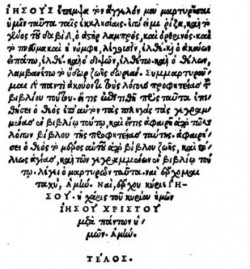
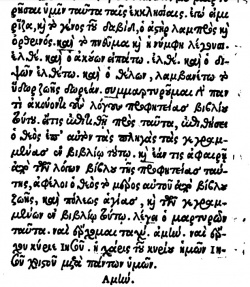
The last six verses of Erasmus' first edition of 1516 claimed to be a back-translation from the Latin:
- Erasmus 1516
- 16 ... ὁ ἀστὴρ ὁ λαμπρὸς καὶ ὀρθρινός.
- 17 Καὶ τὸ πνεῦμα καὶ ἡ νύμφη λέγουσιν, Ἐλθε καὶ ὁ ἀκούων εἰπάτω, Ἐλθε. καὶ ὁ διψῶν ἐλθέτω, καὶ ὁ θέλων λαμβανέτω τὸ ὕδωρ ζωῆς δωρεάν.
- 18 Συμμαρτυροῦμαι γὰρ παντὶ ἀκούοντι τοὺς λόγους τῆς προφητείας τοῦ βιβλίου τούτου, ἐάν τις ἐπιτιθῇ πρὸς ταῦτα, ἐπιθήσει ὁ ἐπ᾽ αὐτὸν τὰς πληγὰς τὰς γεγραμμένας ἐν βιβλίῳ τούτῳ·
- 19 Καὶ ἐάν τις ἀφαιρῇ ἀπὸ τῶν λόγων βιβλου τῆς προφητείας ταύτης, ἀφαιρήσει ὁ θεὸς τὸ μέρος αὐτοῦ ἀπὸ βιβλου τῆς ζωῆς, καὶ ἐκ τῆς πόλεως τῆς ἁγίας, καὶ τῶν γεγραμμένων ἐν βιβλίῳ τούτῳ.
- 20 Λέγει ὁ μαρτυρῶν ταῦτα· ναί, ἔρχομαι ταχύ· Ἀμὴν καὶ ἔρχου Κύριε Ἰησοῦ.
- 21 Ἡ χάρις τοῦ Κυρίου ἡμῶν Ἰησοῦ Χριστοῦ μετὰ πάντων ὑμῶν. Ἀμήν.
- Aldine 1518
- 16 ... ὁ ἀστὴρ λαμπρὸς, καὶ ὀρθρινός·
- 17 καὶ τὸ πνεῦμα καὶ ἡ νύμφη, λέγουσιν, ἐλθε· καὶ ὁ ἀκούων εἰπάτω, ἐλθε· καὶ ὁ διψῶν, ἐλθέτω· καὶ ὁ θέλων, λαμβανέτω τὸ ὕδωρ ζωῆς δωρεάν.
- 18 Συμμαρτυροῦμαι γὰρ παντὶ ἀκούοντι τοὺς λόγους προφητείας τοῦ βιβλίου τούτου· ἐί τις ἐπιτιθῇ πρὸς ταῦτα ἐπιθήσει ὁ θεὸς ἐπ᾽ αὐτὸν τὰς πληγὰς τὰς γεγραμμένας ἐν βιβλίῳ τούτῳ,
- 19 καὶ ἐάν τις ἀφαιρῇ ἀπὸ τῶν λόγων βιβλου τῆς προφητείας ταύτης, ἀφαιρήσει ὁ θεὸς τὸ μέρος αὐτοῦ ἀπὸ βιβλου τῆς ζωῆς, καὶ ἐκ τῆς πόλεως τῆς ἁγίας, καὶ τῶν γεγραμμένων ἐν βιβλίῳ τούτῳ.
- 20 λέγει ὁ μαρτυρῶν ταῦτα· ναί, ἔρχομαι ταχύ, Ἀμὴν· Ναὶ ἔρχου κύριε ἸΗΣΟῨ·
- 21 Ἡ χάρις τοῦ κυρίου ἡμῶν ἸΗΣΟῨ ΧΡΙΣΤΟῨ μετὰ πάντων ὑμῶν· Ἀμήν.
- Erasmus 1519
- 16 ... ὁ ἀστὴρ ὁ λαμπρὸς καὶ ὀρθρινός.
- 17 Καὶ τὸ πνεῦμα καὶ ἡ νύμφη λέγουσιν, ἐλθε. Καὶ ὁ ἀκούων εἰπάτω, ἐλθε. καὶ ὁ διψῶν ἐλθέτω. καὶ ὁ θέλων, λαμβανέτω τὸ ὕδωρ ζωῆς δωρεάν.
- 18 Συμμαρτυροῦμαι γὰρ παντὶ ἀκούοντι τοὺς λόγους προφητείας βιβλΐου τούτου, ἔιτις ἐπιτιθῇ πρὸς ταῦτα, ἐπιθήσει ὁ θεὸς ἐπ᾽ αὐτὸν τὰς πληγὰς τὰς γεγραμμένας ἐν βιβλΐῳ τούτῳ.
- 19 καὶ ἔιτις ἀφαιρῇ ἀπὸ τῶν λόγων βιβλου τῆς προφητείας ταύτης, ἀφελεῖ ὁ θεὸς τὸ μέρος αὐτοῦ ἀπὸ βιβλου ζωῆς, καὶ πόλεως τῆς ἁγΐας, καὶ τῶν γεγραμμένων ἐν βιβλΐῳ τούτῳ.
- 20 λέγει ὁ μαρτυρῶν ταῦτα· ναί, ἔρχομαι ταχύ· ἀμὴν, ναί ἔρχου κύρῖε Ἰησοῦ.
- 21 Ἡ χάρις τοῦ Κυρΐου ἡμῶν Ἰησοῦ Χριστοῦ μετὰ πάντων ὑμῶν. ἀμήν.
- Colines 1534
- 16 ... ὁ ἀστὴρ λαμπρὸς καὶ ὀρθρινός.
- 17 καὶ τὸ πνεῦμα καὶ ἡ νύμφη λέγουσι. ἐλθε. καὶ ὁ ἀκούων εἰπάτω. ἐλθέ. καὶ ὁ διψῶν ἐλθέτω. καὶ ὁ θέλων, λαμβανέτω τὸ ὕδωρ ζωῆς δωρεάν.
- 18 συμμαρτυροῦμαι γὰρ παντὶ ἀκούοντι τοὺς λόγους τῆς προφητείας βιβλίου τούτου. ἐάν τις ἐπιτιθῇ πρὸς ταὐτά. ἐπιθήσει ὁ Θεὸς ἐπ’ αὐτὸν τὰς πληγὰς τὰς γεγραμμένας ἐν βιβλίῳ τούτῳ.
- 19 καὶ ἐάν τις ἀφαιρῇ ἀπὸ τῶν λόγων βίβλου τῆς προφητείας ταύτης, ἀφελοι ὁ Θεὸς τὸ μέρος αὐτοῦ ἀπὸ βίβλου ζωῆς, καὶ πόλεως ἁγίας, καὶ τῶν γεγραμμένων ἐν βιβλίῳ τούτῳ.
- 20 λέγει ὁ μαρτυρῶν ταῦτα. ναί, ἔρχομαι ταχύ. ἀμήν. ναί ἔρχου κύριε Ἰησοῦ.
- 21 Ἡ χάρις τοῦ κυρίου ημῶν Ἰησοῦ Χριστοῦ μετὰ πάντων ὑμῶν. Aμήν.
- Stephanus 1550
- 16 ... ὁ ἀστὴρ ὁ λαμπρὸς καὶ ὀρθρινός
- 17 Καὶ τὸ πνεῦμα καὶ ἡ νύμφη λέγουσιν, Ἐλθε, καὶ ὁ ἀκούων εἰπάτω, Ἐλθε, καὶ ὁ διψῶν ἐλθέτω· καὶ ὁ θέλων λαμβανέτω τὸ ὕδωρ ζωῆς δωρεάν
- 18 Συμμαρτυροῦμαι γὰρ παντὶ ἀκούοντι τοὺς λόγους τῆς προφητείας τοῦ βιβλίου τούτου, ἐάν τις ἐπιτιθῇ πρὸς ταῦτα, ἐπιθήσει ὁ θεὸς ἐπ' αὐτὸν τὰς πληγὰς τὰς γεγραμμένας ἐν βιβλίῳ τούτῳ :19 καὶ ἐάν τις ἀφαιρῇ ἀπὸ τῶν λόγων βίβλου τῆς προφητείας ταύτης ἀφαιρήσει ὁ θεὸς τὸ μέρος αὐτοῦ ἀπὸ βίβλου τῆς ζωῆς καὶ ἐκ τῆς πόλεως τῆς ἁγίας καὶ τῶν γεγραμμένων ἐν βιβλίῳ τούτῳ
- 20 Λέγει ὁ μαρτυρῶν ταῦτα, Ναί ἔρχομαι ταχύ. Ἀμήν, ναί, ἔρχου, κύριε Ἰησοῦ
- 21 Ἡ χάρις τοῦ κυρίου ἡμῶν Ἰησοῦ Χριστοῦ μετὰ πάντων ὑμῶν. Ἀμήν
- Beza 1598
- ... ὁ ἀστὴρ ὁ λαμπρὸς, καὶ ὀρθρινός.
- 17 Καὶ τὸ πνεῦμα καὶ ἡ νύμφη λέγουσιν, Ἐλθε. καὶ ὁ ἀκούων εἰπάτω, Ἐλθε. καὶ ὁ διψῶν ἐλθέτω, καὶ ὁ θέλων λαμβανέτω τὸ ὕδωρ ζωῆς δωρεάν.
- 18 Συμμαρτυροῦμαι γὰρ παντὶ ἀκούοντι τοὺς λόγους τῆς προφητείας τοῦ βιβλίου τούτου, ἐάν τις ἐπιτιθῇ πρὸς ταῦτα, ἐπιθήσει ὁ ἐπ᾽ αὐτὸν τὰς πληγὰς τὰς γεγραμμένας ἐν βιβλίῳ τούτῳ·
- 19 Καὶ ἐάν τις ἀφέλῃ ἀπὸ τῶν λόγων βιβλου τῆς προφητείας ταύτης, ἀφελεῖ ὁ θεὸς τὸ μέρος αὐτοῦ ἀπὸ βιβλου τῆς ζωῆς, καὶ ἐκ τῆς πόλεως τῆς ἁγίας, καὶ τῶν γεγραμμένων ἐν βιβλίῳ τούτῳ.
- 20 Λέγει ὁ μαρτυρῶν ταῦτα· ναί, ἔρχομαι ταχύ. Ἀμὴν καὶ ἔρχου Κύριε Ἰησοῦ.
- 21 Ἡ χάρις τοῦ Κυρίου ἡμῶν Ἰησοῦ Χριστοῦ μετὰ πάντων ὑμῶν. Ἀμήν.
- Scrivener 1881
- 16 ... ὁ ἀστὴρ ὁ λαμπρὸς καὶ ὀρθρινός.
- 17 καὶ τὸ Πνεῦμα καὶ ἡ νύμφη λέγουσιν, Ἐλθε. καὶ ὁ ἀκούων εἰπάτω, Ἐλθε. καὶ ὁ διψῶν ἐλθέτω· καὶ ὁ θέλων λαμβανέτω τὸ ὕδωρ ζωῆς δωρεάν.
- 18 Συμμαρτυροῦμαι γὰρ παντὶ ἀκούοντι τοὺς λόγους τῆς προφητείας τοῦ βιβλίου τούτου, ἐάν τις ἐπιτιθῇ πρὸς ταὐτά, ἐπιθήσει ὁ Θεὸς ἐπ’ αὐτὸν τὰς πληγὰς τὰς γεγραμμένας ἐν βιβλίῳ τούτῳ·
- 19 καὶ ἐάν τις ἀφαιρῇ ἀπὸ τῶν λόγων βίβλου τῆς προφητείας ταύτης, ἀφαιρήσει ὁ Θεὸς τὸ μέρος αὐτοῦ ἀπὸ βίβλου τῆς ζωῆς, καὶ ἐκ τῆς πόλεως τῆς ἁγίας, καὶ τῶν γεγραμμένων ἐν βιβλίῳ τούτῳ.
- 20 λέγει ὁ μαρτυρῶν ταῦτα, ναί, ἔρχομαι ταχύ. ἀμήν. Ναί ἔρχου, Κύριε Ἰησοῦ.
- 21 Ἡ χάρις τοῦ Κυρίου ημῶν Ἰησοῦ Χριστοῦ μετὰ πάντων ὑμῶν. ἀμήν.
| Verse | 1881 | 1598 | 1550 | 1535 | 1527 | 1522 | 1519 | 1516 | 1514 |
|---|---|---|---|---|---|---|---|---|---|
| 22:16 | ὁ | ὁ | ὁ | ὁ | ὁ | ο | |||
| 22:16 | ἀστὴρ | ἀστὴρ | ἀστὴρ | ἀστὴρ | ἀστὴρ | αστήρ | |||
| 22:16 | ὁ | ὁ | ὁ | ὁ | ο | ||||
| 22:16 | λαμπρὸς | λαμπρὸς, | λαμπρὸς | λαμπρὸς | λαμπρός, | λαμπρός | |||
| 22:16 | καὶ | καὶ | καὶ | καὶ | καὶ | ο | |||
| 22:16 | ὀρθρινός. | ὀρθρινός. | ὀρθρινός. | ὀρθρινός. | ὀρθρινός. | πρωϊνός. | |||
| 22:17 | καὶ | Καὶ | Καὶ | Καὶ | καὶ | και | |||
| 22:17 | τὸ | τὸ | τὸ | τὸ | τὸ | το | |||
| 22:17 | Πνεῦμα | πνεῦμα | πνεῦμα | πνεῦμα | πνεῦμα | πνεῦμα | |||
| 22:17 | καὶ | καὶ | καὶ | καὶ | καὶ | και | |||
| 22:17 | ἡ | ἡ | ἡ | ἡ | ἡ | η | |||
| 22:17 | νύμφη | νύμφη | νύμφη | νύμφη | νύμφη | νύμφη | |||
| 22:17 | λέγουσιν, | λέγουσιν, | λέγουσιν, | λέγουσιν, | λέγουσιν, | λέγουσιν | |||
| 22:17 | Ἐλθε. | Ἐλθε. | Ἐλθε, | ἐλθε. | ἐλθέ. | έρχου. | |||
| 22:17 | καὶ | καὶ | καὶ | Καὶ | καὶ | και | |||
| 22:17 | ὁ | ὁ | ὁ | ὁ | ὁ | ο | |||
| 22:17 | ἀκούων | ἀκούων | ἀκούων | ἀκούων | ἀκούων | ἀκούων | |||
| 22:17 | εἰπάτω, | εἰπάτω, | εἰπάτω, | εἰπάτω, | εἰπάτω, | ειπάτω | |||
| 22:17 | Ἐλθε. | Ἐλθε. | Ἐλθε, | ἐλθε. | ἐλθέ. | έρχου. | |||
| 22:17 | καὶ | καὶ | καὶ | καὶ | καὶ | και | |||
| 22:17 | ὁ | ὁ | ὁ | ὁ | ὁ | ο | |||
| 22:17 | διψῶν | διψῶν | διψῶν | διψῶν | διψῶν, | διψῶν | |||
| 22:17 | ἐλθέτω· | ἐλθέτω, | ἐλθέτω· | ἐλθέτω. | ἐλθέτω. | ἐλθέτω· | |||
| 22:17 | καὶ | καὶ | καὶ | καὶ | καὶ | καὶ | |||
| 22:17 | ὁ | ὁ | ὁ | ὁ | ὁ | ὁ | |||
| 22:17 | θέλων | θέλων | θέλων | θέλων, | θέλων, | θέλων | |||
| 22:17 | λαμβανέτω | λαμβανέτω | λαμβανέτω | λαμβανέτω | λαμβανέτω | λαμβανέτω | |||
| 22:17 | τὸ | τὸ | τὸ | τὸ | τὸ | τὸ | |||
| 22:17 | ὕδωρ | ὕδωρ | ὕδωρ | ὕδωρ | ὕδωρ | ύδωρ | |||
| 22:17 | ζωῆς | ζωῆς | ζωῆς | ζωῆς | ζωής | ζωής | |||
| 22:17 | δωρεάν. | δωρεάν. | δωρεάν. | δωρεάν. | δωρεάν, | δωρεάν. | |||
| 22:18 | Συμμαρτυροῦμαι | Συμμαρτυροῦμαι | Συμμαρτυροῦμαι | Συμμαρτυροῦμαι | Συμμαρτυροῦμαι | ||||
| 22:18 | γὰρ | γὰρ | γὰρ | γὰρ | γὰρ | ||||
| 22:18 | παντὶ | παντὶ | παντὶ | παντὶ | παντὶ | ||||
| 22:18 | ἀκούοντι | ἀκούοντι | ἀκούοντι | ἀκούοντι | ἀκούοντι | ||||
| 22:18 | τοὺς | τοὺς | τοὺς | τοὺς | τοὺς | ||||
| 22:18 | λόγους | λόγους | λόγους | λόγους | λόγους | ||||
| 22:18 | τῆς | τῆς | τῆς | ||||||
| 22:18 | προφητείας | προφητείας | προφητείας | προφητείας | προφητείας | ||||
| 22:18 | τοῦ | τοῦ | τοῦ | ||||||
| 22:18 | βιβλίου | βιβλίου | βιβλίου | βιβλΐου | βιβλίου | ||||
| 22:18 | τούτου, | τούτου, | τούτου, | τούτου, | τούτου· | ||||
| 22:18 | ἐάν | ἐάν | ἐάν | ἐί | |||||
| 22:18 | τις | τις | τις | ἔιτις | τις | ||||
| 22:18 | ἐπιτιθῇ | ἐπιτιθῇ | ἐπιτιθῇ | ἐπιτιθῇ | ἐπιτιθῇ | ||||
| 22:18 | πρὸς | πρὸς | πρὸς | πρὸς | πρὸς | ||||
| 22:18 | ταὐτά, | ταῦτα, | ταῦτα, | ταῦτα, | ταῦτα | ||||
| 22:18 | ἐπιθήσει | ἐπιθήσει | ἐπιθήσει | ἐπιθήσει | ἐπιθήσει | ||||
| 22:18 | ὁ | ὁ | ὁ | ὁ | ὁ | ||||
| 22:18 | Θεὸς | Θεὸς Print error | Θεὸς | θεὸς | Θεὸς | ||||
| 22:18 | ἐπ’ | ἐπ᾽ | ἐπ' | ἐπ᾽ | ἐπ’ | ||||
| 22:18 | αὐτὸν | αὐτὸν | αὐτὸν | αὐτὸν | αὐτὸν | ||||
| 22:18 | τὰς | τὰς | τὰς | τὰς | τὰς | ||||
| 22:18 | πληγὰς | πληγὰς | πληγὰς | πληγὰς | πληγὰς | ||||
| 22:18 | τὰς | τὰς | τὰς | τὰς | τὰς | ||||
| 22:18 | γεγραμμένας | γεγραμμένας | γεγραμμένας | γεγραμμένας | γεγραμμένας | ||||
| 22:18 | ἐν | ἐν | ἐν | ἐν | ἐν | ||||
| 22:18 | βιβλίῳ | βιβλίῳ | βιβλίῳ | βιβλΐῳ | βιβλίῳ | ||||
| 22:18 | τούτῳ· | τούτῳ· | τούτῳ· | τούτῳ. | τούτῳ, | ||||
| 22:19 | καὶ | Καὶ | καὶ | καὶ | καὶ | ||||
| 22:19 | ἐάν | ἐάν | ἐάν | ἐί | |||||
| 22:19 | τις | τις | τις | ἔιτις | τις | ||||
| 22:19 | ἀφαιρῇ | ἀφέλῃ | ἀφαιρῇ | ἀφαιρῇ | ἀφαιρῇ | ||||
| 22:19 | ἀπὸ | ἀπὸ | ἀπὸ | ἀπὸ | ἀπὸ | ||||
| 22:19 | τῶν | τῶν | τῶν | τῶν | τῶν | ||||
| 22:19 | λόγων | λόγων | λόγων | λόγων | λόγων | ||||
| 22:19 | βίβλου | βιβλου | βίβλου | βιβλου | βίβλου | ||||
| 22:19 | τῆς | τῆς | τῆς | τῆς | τῆς | ||||
| 22:19 | προφητείας | προφητείας | προφητείας | προφητείας | προφητείας | ||||
| 22:19 | ταύτης, | ταύτης, | ταύτης, | ταύτης, | ταύτης. | ||||
| 22:19 | ἀφαιρήσει | ἀφελεῖ | ἀφαιρήσει | ἀφελεῖ | ἀφαιρήσει | ||||
| 22:19 | ὁ | ὁ | ὁ | ὁ | ὁ | ||||
| 22:19 | Θεὸς | Θεὸς | Θεὸς | θεὸς | Θεὸς | ||||
| 22:19 | τὸ | τὸ | τὸ | τὸ | τὸ | ||||
| 22:19 | μέρος | μέρος | μέρος | μέρος | μέρος | ||||
| 22:19 | αὐτοῦ | αὐτοῦ | αὐτοῦ | αὐτοῦ | αὐτοῦ | ||||
| 22:19 | ἀπὸ | ἀπὸ | ἀπὸ | ἀπὸ | ἀπὸ | ||||
| 22:19 | βίβλου | βιβλου | βίβλου | βιβλου | βίβλου | ||||
| 22:19 | τῆς | τῆς | τῆς | ||||||
| 22:19 | ζωῆς, | ζωῆς, | ζωῆς, | ζωῆς, | ζωῆς, | ||||
| 22:19 | καὶ | καὶ | καὶ | καὶ | καὶ | ||||
| 22:19 | ἐκ | ἐκ | ἐκ | ||||||
| 22:19 | τῆς | τῆς | τῆς | ||||||
| 22:19 | πόλεως | πόλεως | πόλεως | πόλεως | πόλεως | ||||
| 22:19 | τῆς | τῆς | τῆς | τῆς | |||||
| 22:19 | ἁγίας, | ἁγίας, | ἁγίας, | ἁγΐας, | ἁγΐας, | ||||
| 22:19 | καὶ | καὶ | καὶ | καὶ | καὶ | ||||
| 22:19 | τῶν | τῶν | τῶν | τῶν | τῶν | ||||
| 22:19 | γεγραμμένων | γεγραμμένων | γεγραμμένων | γεγραμμένων | γεγραμμένων | ||||
| 22:19 | ἐν | ἐν | ἐν | ἐν | ἐν | ||||
| 22:19 | βιβλίῳ | βιβλίῳ | βιβλίῳ | βιβλΐῳ | βιβλίῳ | ||||
| 22:19 | τούτῳ. | τούτῳ. | τούτῳ. | τούτῳ. | τούτῳ. | ||||
| 22:20 | λέγει | Λέγει | Λέγει | λέγει | λέγει | ||||
| 22:20 | ὁ | ὁ | ὁ | ὁ | ὁ | ||||
| 22:20 | μαρτυρῶν | μαρτυρῶν | μαρτυρῶν | μαρτυρῶν | μαρτυρῶν | ||||
| 22:20 | ταῦτα, | ταῦτα· | ταῦτα, | ταῦτα· | ταῦτα. | ||||
| 22:20 | ναί, | ναί, | ναί | ναί, | ναί | ||||
| 22:20 | ἔρχομαι | ἔρχομαι | ἔρχομαι | ἔρχομαι | ἔρχομαι | ||||
| 22:20 | ταχύ. | ταχύ. | ταχύ. | ταχύ· | ταχύ, | ||||
| 22:20 | ἀμήν. | Ἀμὴν | ἀμήν. | ἀμὴν, | ἀμήν. | ||||
| 22:20 | Ναί | καὶ | ναί, | ναί | ναί, | ||||
| 22:20 | ἔρχου | ἔρχου | ἔρχου | ἔρχου | ἔρχου | ||||
| 22:20 | Κύριε | Κύριε | Κύριε | κύρῖε | κύριε | ||||
| 22:20 | Ἰησοῦ. | Ἰησοῦ. | Ἰησοῦ. | Ἰησοῦ. | IHΣΟΥ. | ||||
| 22:21 | Ἡ | Ἡ | ἡ | Ἡ | Ἡ | ||||
| 22:21 | χάρις | χάρις | χάρις | χάρις | χάρις | ||||
| 22:21 | τοῦ | τοῦ | τοῦ | τοῦ | τοῦ | ||||
| 22:21 | Κυρίου | Κυρίου | Κυρίου | Κυρΐου | κυρίου | ||||
| 22:21 | ημῶν | ἡμῶν | ἡμῶν | ἡμῶν | ἡμῶν | ||||
| 22:21 | Ἰησοῦ | Ἰησοῦ | Ἰησοῦ | Ἰησοῦ | IHΣΟΥ | ||||
| 22:21 | Χριστοῦ | Χριστοῦ | Χριστοῦ | Χριστοῦ | ΧΡΙΣΤΟΥ | ||||
| 22:21 | μετὰ | μετὰ | μετὰ | μετὰ | μετὰ | ||||
| 22:21 | πάντων | πάντων | πάντων | πάντων | πάντων | ||||
| 22:21 | ὑμῶν. | ὑμῶν. | ὑμῶν. | ὑμῶν. | ὑμῶν. | ||||
| 22:21 | ἀμήν. | Ἀμήν. | Ἀμήν. | ἀμήν. | Ἀμήν. |
(Unfinished chart)
See Also
- Revelation 22:16; 17; 18; 19; 20; & 21.
- Desiderius Erasmus
- Minuscule 2814 1rK
- Johann Reuchlin
- Franz Delitzsch
- Jan Krans
- James White
- Bruce Metzger
- Novum Instrumentum omne
- Latin Vulgate
External Links
- Revelation 22:19 -"book of life" and the last six verses of Revelation 22 An excerpt from Dr. Thomas Holland's Crowned With Glory
- The Myth of Erasmus' " THE MYTH OF ERASMUS’ “Back Translating”. by christianhospitality.org
- Erasmian Myths: Revelation Back Translated from the Vulgate? by Chris Thomas June 8th, 2016
- Erasmus and the Greek Text of Revelation (Jan Krans) YouTube Video, 6 Jul 2020.
- Erasmus' Manuscript of Revelation by James Snapp Jr
- Erasmus and the Text of Revelation 22:19 - A Critique of Thomas Holland’s Crowned With Glory by Jan Krans
- “Book of life” or “Tree of life” in Revelation 22:19? by KJVToday.net
- Nick Sayers Examining the Last Six Verses of Revelation YouTube 7th Nov 2021.

|
![]() 1 ·
1 ·
![]() 2 ·
2 ·
![]() 3 ·
3 ·
![]() 4 ·
4 ·
![]() 5 ·
5 ·
![]() 6 ·
6 ·
![]() 7 ·
7 ·
![]() 8 ·
8 ·
![]() 9 ·
9 ·
![]() 10 ·
10 ·
![]() 11 ·
11 ·
![]() 12 ·
12 ·
![]() 13 ·
13 ·
![]() 14 ·
14 ·
![]() 15 ·
15 ·
![]() 16 ·
16 ·
![]() 17 ·
17 ·
![]() 18 ·
18 ·
![]() 19 ·
19 ·
![]() 20 ·
20 ·
![]() 21 ·
21 ·
![]() 22 ·
22 ·
![]() 23 ·
23 ·
![]() 24 ·
24 ·
![]() 25 ·
25 ·
![]() 26 ·
26 ·
![]() 27 ·
27 ·
![]() 28 ·
28 ·
![]() 29 ·
29 ·
![]() 30 ·
30 ·
![]() 31 ·
31 ·
![]() 32 ·
32 ·
![]() 33 ·
33 ·
![]() 34 ·
34 ·
![]() 35 ·
35 ·
![]() 36 ·
36 ·
![]() 37 ·
37 ·
![]() 38 ·
38 ·
![]() 39 ·
39 ·
![]() 40 ·
40 ·
![]() 41 ·
41 ·
![]() 42 ·
42 ·
![]() 43 ·
43 ·
![]() 44 ·
44 ·
![]() 45 ·
45 ·
![]() 46 ·
46 ·
![]() 47 ·
47 ·
![]() 48 ·
48 ·
![]() 49 ·
49 ·
![]() 50 ·
50 ·
![]() 51 ·
51 ·
![]() 52 ·
52 ·
![]() 53 ·
53 ·
![]() 54 ·
54 ·
![]() 55 ·
55 ·
![]() 56 ·
56 ·
![]() 57 ·
57 ·
![]() 58 ·
58 ·
![]() 59 ·
59 ·
![]() 60 ·
60 ·
![]() 61 ·
61 ·
![]() 62 ·
62 ·
![]() 63 ·
63 ·
![]() 64 ·
64 ·
![]() 65 ·
65 ·
![]() 66 ·
66 ·
![]() 67 ·
67 ·
![]() 68 ·
68 ·
![]() 69 ·
69 ·
![]() 70 ·
70 ·
![]() 71 ·
71 ·
![]() 72 ·
72 ·
![]() 73 ·
73 ·
![]() 74 ·
74 ·
![]() 75 ·
75 ·
![]() 76 ·
76 ·
![]() 77 ·
77 ·
![]() 78 ·
78 ·
![]() 79 ·
79 ·
![]() 80 ·
80 ·
![]() 81 ·
81 ·
![]() 82 ·
82 ·
![]() 83 ·
83 ·
![]() 84 ·
84 ·
![]() 85 ·
85 ·
![]() 86 ·
86 ·
![]() 87 ·
87 ·
![]() 88 ·
88 ·
![]() 89 ·
89 ·
![]() 90 ·
90 ·
![]() 91 ·
91 ·
![]() 92 ·
92 ·
![]() 93 ·
93 ·
![]() 94 ·
94 ·
![]() 95 ·
95 ·
![]() 96 ·
96 ·
![]() 97 ·
97 ·
![]() 98 ·
98 ·
![]() 99 ·
99 ·
![]() 100 ·
100 ·
![]() 101 ·
101 ·
![]() 102 ·
102 ·
![]() 103 ·
103 ·
![]() 104 ·
104 ·
![]() 105 ·
105 ·
![]() 106 ·
106 ·
![]() 107 ·
107 ·
![]() 108 ·
108 ·
![]() 109 ·
109 ·
![]() 110 ·
110 ·
![]() 111 ·
111 ·
![]() 112 ·
112 ·
![]() 113 ·
113 ·
![]() 114 ·
114 ·
![]() 115 ·
115 ·
![]() 116 ·
116 ·
![]() 117 ·
117 ·
![]() 118 ·
118 ·
![]() 119 ·
119 ·
![]() 120 ·
120 ·
![]() 121 ·
121 ·
![]() 122 ·
122 ·
![]() 123 ·
123 ·
![]() 124 ·
124 ·
![]() 125 ·
125 ·
![]() 126 ·
126 ·
![]() 127 ·
127 ·
![]() 128 ·
128 ·
![]() 129 ·
129 ·
![]() 130 ·
130 ·
![]() 131 ·
131 ·
![]() 132 ·
132 ·
![]() 133 ·
133 ·
![]() 134 ·
134 ·
![]() 135 ·
135 ·
![]() 136 ·
136 ·
![]() 137 ·
137 ·
![]() 138 ·
138 ·
![]() 139 ·
139 ·
![]() 140 ·
140 ·
List of New Testament minuscules
1 · 2 · 3 · 4 · 5 · 6 · 7 · 8 · 9 · 10 · 11 · 12 · 13 · 14 · 15 · 16 · 17 · 18 · 19 · 20 · 21 · 22 · 23 · 24 · 25 · 26 · 27 · 28 · 29 · 30 · 31 · 32 · 33 · 34 · 35 · 36 · 37 · 38 · 39 · 40 · 41 · 42 · 43 · 44 · 45 · 46 · 47 · 48 · 49 · 50 · 51 · 52 · 53 · 54 · 55 · 56 · 57 · 58 · 59 · 60 · 61 · 62 · 63 · 64 · 65 · 66 · 67 · 68 · 69 · 70 · 71 · 72 · 73 · 74 · 75 · 76 · 77 · 78 · 79 · 80 · 81 · 82 · 83 · 84 · 85 · 86 · 87 · 88 · 89 · 90 · 91 · 92 · 93 · 94 · 95 · 96 · 97 · 98 · 99 · 100 · 101 · 102 · 103 · 104 · 105 · 106 · 107 · 108 · 109 · 110 · 111 · 112 · 113 · 114 · 115 · 116 · 117 · 118 · 119 · 120 · 121 · 122 · 123 · 124 · 125 · 126 · 127 · 128 · 129 · 130 · 131 · 132 · 133 · 134 · 135 · 136 · 137 · 138 · 139 · 140 · 141 · 142 · 143 · 144 · 145 · 146 · 147 · 148 · 149 · 150 · 151 · 152 · 153 · 154 · 155 · 156 · 157 · 158 · 159 · 160 · 161 · 162 · 163 · 164 · 165 · 166 · 167 · 168 · 169 · 170 · 171 · 172 · 173 · 174 · 175 · 176 · 177 · 178 · 179 · 180 · 181 · 182 · 183 · 184 · 185 · 186 · 187 · 188 · 189 · 190 · 191 · 192 · 193 · 194 · 195 · 196 · 197 · 198 · 199 · 200 · 201 · 202 · 203 · 204 · 205 · 206 · 207 · 208 · 209 · 210 · 211 · 212 · 213 · 214 · 215 · 216 · 217 · 218 · 219 · 220 · 221 · 222 · 223 · 224 · 225 · 226 · 227 · 228 · 229 · 230 · 231 · 232 · 233 · 234 · 235 · 236 · 237 · 238 · 239 · 240 · 241 · 242 · 243 · 244 · 245 · 246 · 247 · 248 · 249 · 250 · 251 · 252 · 253 · 254 · 255 · 256 · 257 · 258 · 259 · 260 · 261 · 262 · 263 · 264 · 265 · 266 · 267 · 268 · 269 · 270 · 271 · 272 · 273 · 274 · 275 · 276 · 277 · 278 · 279 · 280 · 281 · 282 · 283 · 284 · 285 · 286 · 287 · 288 · 289 · 290 · 291 · 292 · 293 · 294 · 295 · 296 · 297 · 298 · 299 · 300 · 301 · 302 · 303 · 304 · 305 · 306 · 307 · 308 · 309 · 310 · 311 · 312 · 313 · 314 · 315 · 316 · 317 · 318 · 319 · 320 · 321 · 322 · 323 · 324 · 325 · 326 · 327 · 328 · 329 · 330 · 331 · 332 · 333 · 334 · 335 · 336 · 337 · 338 · 339 · 340 · 341 · 342 · 343 · 344 · 345 · 346 · 347 · 348 · 349 · 350 · 351 · 352 · 353 · 354 · 355 · 356 · 357 · 358 · 359 · 360 · 361 · 362 · 363 · 364 · 365 · 366 · 367 · 368 · 369 · 370 · 371 · 372 · 373 · 374 · 375 · 376 · 377 · 378 · 379 · 380 · 381 · 382 · 383 · 384 · 385 · 386 · 387 · 388 · 389 · 390 · 391 · 392 · 393 · 394 · 395 · 396 · 397 · 398 · 399 · 400 · 401 · 402 · 403 · 404 · 405 · 406 · 407 · 408 · 409 · 410 · 411 · 412 · 413 · 414 · 415 · 416 · 417 · 418 · 419 · 420 · 421 · 422 · 423 · 424 · 425 · 426 · 427 · 428 · 429 · 430 · 431 · 432 · 433 · 434 · 435 · 436 · 437 · 438 · 439 · 440 · 441 · 442 · 443 · 444 · 445 · 446 · 447 · 448 · 449 · 450 · 451 · 452 · 453 · 454 · 455 · 456 · 457 · 458 · 459 · 460 · 461 · 462 · 463 · 464 · 465 · 466 · 467 · 468 · 469 · 470 · 471 · 472 · 473 · 474 · 475 · 476 · 477 · 478 · 479 · 480 · 481 · 482 · 483 · 484 · 485 · 486 · 487 · 488 · 489 · 490 · 491 · 492 · 493 · 494 · 495 · 496 · 497 · 498 · 499 · 500 · 501 · 502 · 503 · 504 · 505 · 506 · 507 · 543 · 544 · 565 · 566 · 579 · 585 · 614 · 639 · 653 · 654 · 655 · 656 · 657 · 658 · 659 · 660 · 661 · 669 · 676 · 685 · 700 · 798 · 823 · 824 · 825 · 826 · 827 · 828 · 829 · 830 · 831 · 876 · 891 · 892 · 893 · 918 · 1071 · 1143 · 1152 · 1241 · 1253 · 1423 · 1424 · 1432 · 1582 · 1739 · 1780 · 1813 · 1834 · 2050 · 2053 · 2059 · 2060 · 2061 · 2062 · 2174 · 2268 · 2344 · 2423 · 2427 · 2437 · 2444 · 2445 · 2446 · 2460 · 2464 · 2491 · 2495 · 2612 · 2613 · 2614 · 2615 · 2616 · 2641 · 2754 · 2755 · 2756 · 2757 · 2766 · 2767 · 2768 · 2793 · 2802 · 2803 · 2804 · 2805 · 2806 · 2807 · 2808 · 2809 · 2810 · 2811 · 2812 · 2813 · 2814 · 2815 · 2816 · 2817 · 2818 · 2819 · 2820 · 2821 · 2855 · 2856 · 2857 · 2858 · 2859 · 2860 · 2861 · 2862 · 2863 · 2881 · 2882 · 2907 · 2965 ·
01 · 02 · 03 · 04 · 05 · 06 · 07 · 08 · 09 · 010 · 011 · 012 · 013 · 014 · 015 · 016 · 017 · 018 · 019 · 020 · 021 · 022 · 023 · 024 · 025 · 026 · 027 · 028 · 029 · 030 · 031 · 032 · 033 · 034 · 035 · 036 · 037 · 038 · 039 · 040 · 041 · 042 · 043 · 044 · 045 · 046 · 047 · 048 · 049 · 050 · 051 · 052 · 053 · 054 · 055 · 056 · 057 · 058 · 059 · 060 · 061 · 062 · 063 · 064 · 065 · 066 · 067 · 068 · 069 · 070 · 071 · 072 · 073 · 074 · 075 · 076 · 077 · 078 · 079 · 080 · 081 · 082 · 083 · 084 · 085 · 086 · 087 · 088 · 089 · 090 · 091 · 092 · 093 · 094 · 095 · 096 · 097 · 098 · 099 · 0100 · 0101 · 0102 · 0103 · 0104 · 0105 · 0106 · 0107 · 0108 · 0109 · 0110 · 0111 · 0112 · 0113 · 0114 · 0115 · 0116 · 0117 · 0118 · 0119 · 0120 · 0121 · 0122 · 0123 · 0124 · 0125 · 0126 · 0127 · 0128 · 0129 · 0130 · 0131 · 0132 · 0134 · 0135 · 0136 · 0137 · 0138 · 0139 · 0140 · 0141 · 0142 · 0143 · 0144 · 0145 · 0146 · 0147 · 0148 · 0149 · 0150 · 0151 · 0152 · 0153 · 0154 · 0155 · 0156 · 0157 · 0158 · 0159 · 0160 · 0161 · 0162 · 0163 · 0164 · 0165 · 0166 · 0167 · 0168 · 0169 · 0170 · 0171 · 0172 · 0173 · 0174 · 0175 · 0176 · 0177 · 0178 · 0179 · 0180 · 0181 · 0182 · 0183 · 0184 · 0185 · 0186 · 0187 · 0188 · 0189 · 0190 · 0191 · 0192 · 0193 · 0194 · 0195 · 0196 · 0197 · 0198 · 0199 · 0200 · 0201 · 0202 · 0203 · 0204 · 0205 · 0206 · 0207 · 0208 · 0209 · 0210 · 0211 · 0212 · 0213 · 0214 · 0215 · 0216 · 0217 · 0218 · 0219 · 0220 · 0221 · 0222 · 0223 · 0224 · 0225 · 0226 · 0227 · 0228 · 0229 · 0230 · 0231 · 0232 · 0234 · 0235 · 0236 · 0237 · 0238 · 0239 · 0240 · 0241 · 0242 · 0243 · 0244 · 0245 · 0246 · 0247 · 0248 · 0249 · 0250 · 0251 · 0252 · 0253 · 0254 · 0255 · 0256 · 0257 · 0258 · 0259 · 0260 · 0261 · 0262 · 0263 · 0264 · 0265 · 0266 · 0267 · 0268 · 0269 · 0270 · 0271 · 0272 · 0273 · 0274 · 0275 · 0276 · 0277 · 0278 · 0279 · 0280 · 0281 · 0282 · 0283 · 0284 · 0285 · 0286 · 0287 · 0288 · 0289 · 0290 · 0291 · 0292 · 0293 · 0294 · 0295 · 0296 · 0297 · 0298 · 0299 · 0300 · 0301 · 0302 · 0303 · 0304 · 0305 · 0306 · 0307 · 0308 · 0309 · 0310 · 0311 · 0312 · 0313 · 0314 · 0315 · 0316 · 0317 · 0318 · 0319 · 0320 · 0321 · 0322 · 0323 ·
List of New Testament lectionaries
1 · 2 · 3 · 4 · 5 · 6 · 7 · 8 · 9 · 10 · 11 · 12 · 13 · 14 · 15 · 16 · 17 · 18 · 19 · 20 · 21 · 22 · 23 · 24 · 25 · 25b · 26 · 27 · 28 · 29 · 30 · 31 · 32 · 33 · 34 · 35 · 36 · 37 · 38 · 39 · 40 · 41 · 42 · 43 · 44 · 45 · 46 · 47 · 48 · 49 · 50 · 51 · 52 · 53 · 54 · 55 · 56 · 57 · 58 · 59 · 60 · 61 · 62 · 63 · 64 · 65 · 66 · 67 · 68 · 69 · 70 · 71 · 72 · 73 · 74 · 75 · 76 · 77 · 78 · 79 · 80 · 81 · 82 · 83 · 84 · 85 · 86 · 87 · 88 · 89 · 90 · 91 · 92 · 93 · 94 · 95 · 96 · 97 · 98 · 99 · 100 · 101 · 102 · 103 · 104 · 105 · 106 · 107 · 108 · 109 · 110 · 111 · 112 · 113 · 114 · 115 · 116 · 117 · 118 · 119 · 120 · 121 · 122 · 123 · 124 · 125 · 126 · 127 · 128 · 129 · 130 · 131 · 132 · 133 · 134 · 135 · 136 · 137 · 138 · 139 · 140 · 141 · 142 · 143 · 144 · 145 · 146 · 147 · 148 · 149 · 150 · 151 · 152 · 153 · 154 · 155 · 156 · 157 · 158 · 159 · 160 · 161 · 162 · 163 · 164 · 165 · 166 · 167 · 168 · 169 · 170 · 171 · 172 · 173 · 174 · 175 · 176 · 177 · 178 · 179 · 180 · 181 · 182 · 183 · 184 · 185 · 186 · 187 · 188 · 189 · 190 · 191 · 192 · 193 · 194 · 195 · 196 · 197 · 198 · 199 · 200 · 201 · 202 · 203 · 204 · 205 · 206a · 206b · 207 · 208 · 209 · 210 · 211 · 212 · 213 · 214 · 215 · 216 · 217 · 218 · 219 · 220 · 221 · 222 · 223 · 224 · 225 · 226 · 227 · 228 · 229 · 230 · 231 · 232 · 233 · 234 · 235 · 236 · 237 · 238 · 239 · 240 · 241 · 242 · 243 · 244 · 245 · 246 · 247 · 248 · 249 · 250 · 251 · 252 · 253 · 254 · 255 · 256 · 257 · 258 · 259 · 260 · 261 · 262 · 263 · 264 · 265 · 266 · 267 · 268 · 269 · 270 · 271 · 272 · 273 · 274 · 275 · 276 · 277 · 278 · 279 · 280 · 281 · 282 · 283 · 284 · 285 · 286 · 287 · 288 · 289 · 290 · 291 · 292 · 293 · 294 · 295 · 296 · 297 · 298 · 299 · 300 · 301 · 302 · 303 · 304 · 305 · 306 · 307 · 308 · 309 · 310 · 311 · 312 · 313 · 314 · 315 · 316 · 317 · 318 · 319 · 320 · 321 · 322 · 323 · 324 · 325 · 326 · 327 · 328 · 329 · 330 · 331 · 332 · 368 · 449 · 451 · 501 · 502 · 542 · 560 · 561 · 562 · 563 · 564 · 648 · 649 · 809 · 965 · 1033 · 1358 · 1386 · 1491 · 1423 · 1561 · 1575 · 1598 · 1599 · 1602 · 1604 · 1614 · 1619 · 1623 · 1637 · 1681 · 1682 · 1683 · 1684 · 1685 · 1686 · 1691 · 1813 · 1839 · 1965 · 1966 · 1967 · 2005 · 2137 · 2138 · 2139 · 2140 · 2141 · 2142 · 2143 · 2144 · 2145 · 2164 · 2208 · 2210 · 2211 · 2260 · 2261 · 2263 · 2264 · 2265 · 2266 · 2267 · 2276 · 2307 · 2321 · 2352 · 2404 · 2405 · 2406 · 2411 · 2412 ·
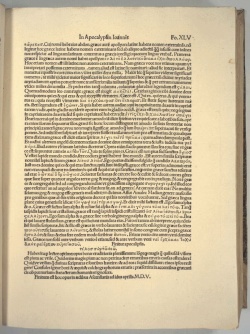
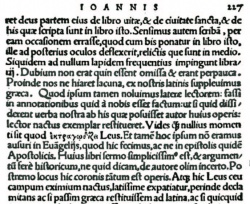
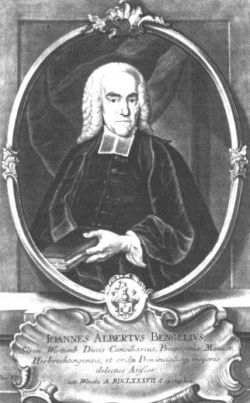
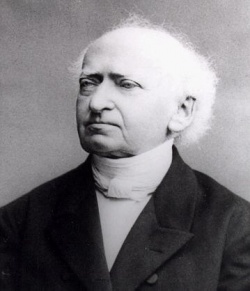
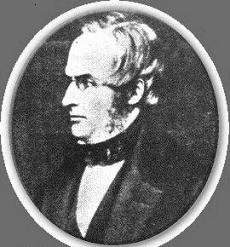
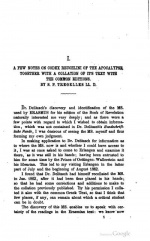
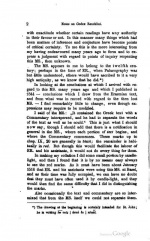
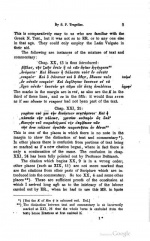
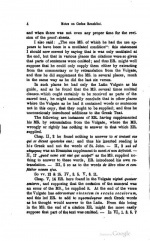
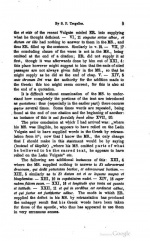
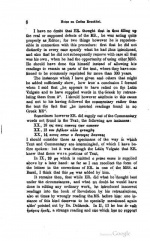
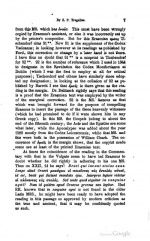
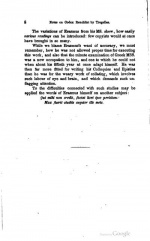
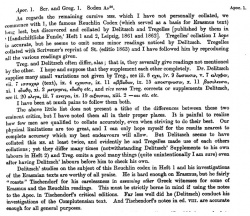
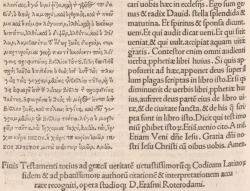
![Revelation 22.16-17 at page 564 in Desiderius Erasmus' 1519 edition [1].](/w/images/thumb/b/b5/Revelation_22.16-21a_erasmus_1519.jpg/250px-Revelation_22.16-21a_erasmus_1519.jpg)
![Revelation 22.17-21 at page 565 in Desiderius Erasmus' 1519 edition[2].](/w/images/thumb/0/08/Revelation_22.16-21b_erasmus_1519.jpg/250px-Revelation_22.16-21b_erasmus_1519.jpg)

